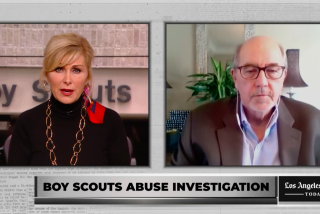Tabloids apologize to girl’s parents
- Share via
LONDON — In the 10 months since their nearly 4-year-old daughter disappeared during a beach holiday in Portugal, Kate and Gerry McCann have become possibly Britain’s best-known couple and, in some quarters of the tabloid press, its most reviled.
The near-absence of facts from the Portuguese investigation did nothing to slow the barrage of headlines in papers like the Daily Express. “It was her blood in parents’ hire car,” said one headline, implying that the McCanns were the chief suspects in their daughter’s disappearance.
On Wednesday, the Daily Express and its sister paper carried a different top-of-the-page headline. “Kate and Gerry McCann: Sorry,” it said. The newspapers also agreed to pay the couple $1.1 million in libel damages.
The newspapers acknowledged that “there is no evidence whatsoever to support this theory, and that Kate and Gerry are completely innocent of any involvement in their daughter’s disappearance.”
The front-page apology sent shock waves through the British media, which are undergoing an extraordinary period of self-reflection.
Even as the Express settlement was announced, the Daily Mail apologized and agreed to pay damages in a libel case filed by Las Vegas Sands Corp. casino magnate Sheldon G. Adelson.
The plaintiff’s attorneys estimate the agreement and legal expenses will cost the newspaper $8 million.
This story, which stemmed from 2005 negotiations over ownership of the Manchester United soccer team and proposals for a casino near its stadium, had accused Adelson of cutthroat business practices and a variety of personal offenses, including asking his wife for a divorce on the night before she was to have cancer surgery.
The newspaper’s lawyer, Lindsay Hodgkinson, acknowledged in court Wednesday that the allegations were “unfounded.”
The tabloid press makes its living being nasty to celebrities (close-ups of an “ugly rash” on singer Amy Winehouse were featured recently in the Evening Standard), documenting carousing by young royals and campaigning against immigrants from Central Europe.
But the McCann case struck a nerve in part because the entire British press, not just the tabloids, has been consumed with the story on and off since the little girl disappeared in May.
The announcement by Portuguese authorities in September that the McCanns had been designated arguido, a term similar to “suspect,” led to stories that appeared to give credence to the theory that the McCanns might have accidentally killed their daughter, then hidden the body. No police official ever made such an allegation publicly.
Despite the Express’ assertion that “there is no evidence whatsoever” to support the theory that the McCanns were behind their daughter’s disappearance, police have not publicly exonerated them.
The McCanns’ lawyer, Adam Tudor, said the Express, its sister paper, the Daily Star, and their two Sunday co-publications, all of which are running front-page apologies, had published “well over 100 articles making these appalling, defamatory allegations.”
The stories have looked increasingly dubious as witnesses have come forward to say that they saw a mysterious man carrying a child near the apartment just before Madeleine disappeared.
There appears to have been no case of a front-page apology in the British press since the 1980s, and none in memory of four newspapers being obliged to print one all at the same time.
The case comes during a period of soul-searching for the British media. A new book making the rounds, “Flat Earth News,” accuses them of becoming a conduit for propaganda, falsehoods and secondhand news.
The book, by award-winning reporter Nick Davies, contains research from Cardiff University purporting to show that just 12% of 2,000 stories at quality dailies during a recent period were wholly composed of material researched by the reporters who wrote them.
Because of cost cutting and the expansion into 24-hour Internet news operations, the research found, the average Fleet Street journalist now is filling three times as much space as in 1985.
Mike Jempson, director of the MediaWise Trust, a charity that focuses on journalism ethics, said the McCann settlement raises questions about the economics of libel: how much money newspapers made by featuring scandalous stories about the McCanns versus how much they were required to pay out in settlement.
“That’s the big problem with British newspapers: It’s all about sales, it’s all about tipping the balance each day in favor of new readers,” Jempson said.
The publications also have removed the offending articles from their online archives, as opposed to the standard practice, which calls for retaining them with a flag that indicates they are not to be relied on.
“It’s rewriting history,” he said. “So we now don’t know what was said. . . . It might satisfy the McCanns, but the whole of the public has been misled.”
Bob Satchwell, executive director of the Society of Editors, said the Express and the Star deserved some credit. “They said, ‘We’ve got it wrong, we’re going to apologize in big type on the front page, and we’re going to pay rather a large sum of money.’ ”
British libel laws, much more favorable to plaintiffs than those in the U.S., would have made it very difficult for the newspapers to defend a case filed by the McCanns, Satchwell said.
He warned that the settlement could have a chilling effect on aggressive reporting of a newsworthy but closely held investigation.
The McCanns have said they will put the money from the settlement into a fund established to help find their daughter, who they believe is still alive.
--
More to Read
Sign up for Essential California
The most important California stories and recommendations in your inbox every morning.
You may occasionally receive promotional content from the Los Angeles Times.













